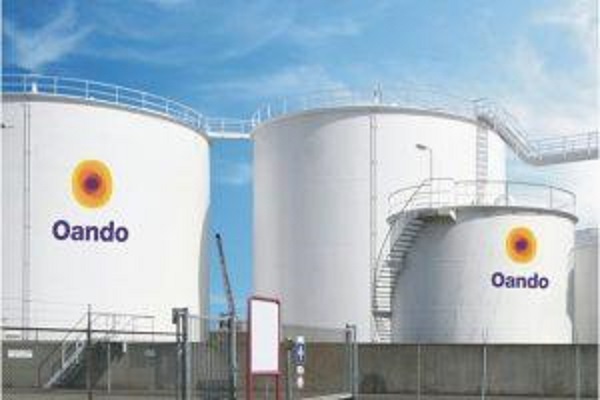By Adewale Sanyaolu
Oando Trading, the trading arm of Nigeria’s Oando Plc, has suffered a major blow as Trinidad and Tobago reversed its earlier decision to sell the 175,000 barrels-per-day Guaracara Refining Company Limited (GRC) assets.
The reversal, orchestrated by the new government in the Caribbean nation, comes just months after it earlier named Oando the preferred bidder for the refinery, which is owned by state-run Trinidad Petroleum Holdings Ltd (TPHL).
In February, then Energy Minister, Stuart Young, publicly announced Oando’s selection, a development that marked a potential milestone in cross-regional energy collaboration.
Oando’s Chief Compliance Officer and Company Secretary, Ayotola Jagun, at the time, described the award as a strong endorsement of the company’s reputation for innovation and infrastructure delivery.
He added that it aligned with Oando’s strategic vision to expand its footprint across the Caribbean.
According to him, the partnership also represented a strategic bridge between Africa and the Caribbean, as Oando’s involvement in the refinery will serve as a catalyst for deeper Afro-Caribbean collaboration in the energy sector, paving the way for increased trade, investment and knowledge exchange.
He added that the initiative highlighted Africa’s growing influence in the global energy landscape and highlights the role of indigenous African companies in fostering economic transformation across borders.
Wale Tinubu, the Group Chief Executive of Oando Plc, who also commented on the deal said: “We are honoured by the confidence the Trinidadian government has placed in us with this award. This strategic investment aligns with our long-term vision of expanding into high-potential regions and growing our operational footprint, leveraging our vast technical expertise and global partnerships to finance projects.
“We recognise the significance of this opportunity and look forward to working with all stakeholders to deliver maximum value for all parties involved.”
The refinery, located in Pointe-à-Pierre, Trinidad and Tobago, remains a vital energy asset in the Caribbean. It was established over a century ago and historically has been the cornerstone of Trinidad and Tobago’s oil industry.
With a capacity of 175,000 barrels per day and a Nelson Complexity Index of 8.0, the refinery is well-suited for processing regional crude oils and supplying both domestic and regional markets with refined products.
“The next steps in the process involve detailed discussions with the government and regulatory authorities to finalise the lease agreement and operational framework. As this process progresses, Oando Plc will continue to provide timely updates to stakeholders and the public,” Tinubu added.
However, all the lofty plans went up in flames as a new administration is in place, different from the one that sealed a deal with Oando.
The new Prime Minister, Kamla Persad-Bissessar, has made it clear that her government will no longer go ahead with Oando and that they will not honour any deal signed by the PNM (the previous party in power).
The cancellation of the deal by Trinidad and Tobago has further sparked fresh conversations about the need to respect the sanctity of contracts for countries craving foreign direct investment (FDI).
The Confederation of Regional Business Chambers recently met with oilfield workers’ Trade Union (OWTU), Joint Trade Union Movement (JTUM), National Union of Government and Federated Workers (NUGFW), and the Public Services Association (PSA) to discuss the refinery’s restart.
At the heart of the discussions is a shared “patriotic spirit,” which emphasizes the importance of the refinery remaining owned by the people of Trinidad and Tobago, stressing that national ownership and the country’s best interests must come first, even as foreign investment is welcome.
Commenting on the development, Country Manager and COO, Energy Professional – Downstream and Midstream Oil and Gas, Jide Pratt, said it is interesting to watch how this plays out.
He added that the similarities between how the situation is playing out in Trinidad and Tobago and what happened in Nigeria two decades ago are striking.
“In fact, two decades on, the ghost of those actions still haunts us.”
In his own reaction on X, formerly Twitter, a public commentator, Sadiq Odubayo, said the country will end up with a rundown refinery like Nigeria has.
“I assume that the Trinidad and Tobago government can’t keep up with running a refinery long-term—hence the initial desire to sell. But selling does not equate to not having a seat at the table and looking out for workers. The inevitable will eventually happen.
“Sometimes, I wonder who advises government entities when they make these deals. Similar to how NNPC missed out on a 20 per cent stake in the Dangote refinery. On the other hand, Marathon Oil’s Galveston Bay, Texas refinery (631k bpd) generated $138 billion in 2024, and you don’t need a herbalist to tell you that within a decade, the Dangote refinery should be inching close to $60 billion to $70 billion in revenue”, he said.


















Leave a comment